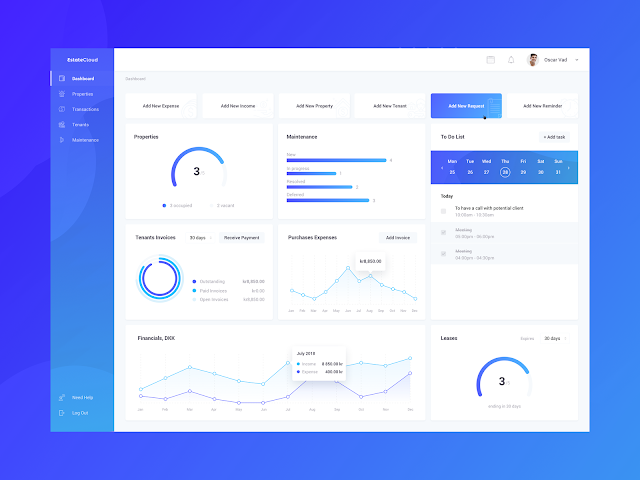Ad Code
Translate
List of 6,000+ Dofollow Commentluv Blogs FREE (Updated 2025)
January 16, 2025
What is Ozempic (semaglutide)? (Updated in 2025)
January 30, 2025
How To Find Suitable Properties In Cyprus? (Updated in 2025)
January 11, 2025
Smart strategies for trading on crypto exchanges
February 18, 2025
Reasons Why You Need A Real Estate CRM
Khabza Mkhize
November 24, 2020

Real estate is going through a massive transition with a low interest rate and high inventory. This makes it a compelling factor for real estate agents to exceed customer experience in order to drive success.
A stat from the National Association of Realtors (NAR) indicates that 99% of millennials and 89% of old boomers conducted an online search before purchasing a home. The real-estate involves switching between multiple tasks, and this where CRM for real estate comes into play.
Coming with the 360 bird’s eye view, it identifies the bottlenecks in the deal and evaluates where it is proceeding. Let’s understand how CRM enhances customer experience that generates better revenue for real-estate.
Reasons for Adopting CRM in Real Estate
Know about Your Prospect
A real-estate can get lead from various sources, like a personal website, social media, and other offline routes. After collecting all the information about the customer, it is time to manage the leads. A real estate CRM can store and manage all the data of the prospects, such as their name, address, email id, contact number, etc.The software can even trace customer engagement and provide better insights about the prospects. It can check visitors’ engagement patterns and offer an excellent real-time session in discussing the deal.
Prioritize Lead
There are thousands of leads generated in real-estate business. However, only a small percentage have the potential of converting into clients. This is where a real estate CRM can be useful.A business can categorize the clients into warm, cold, and average based on their engagement and interest. This feature ensures that you put more effort into active communication with such clients and go for timely follow-ups.
Centralized Database for Customer Information
A report states that 80% of the data analysts spend time discovering and preparing data. The CRM for real estate provides a chronological timeline that shows customer’s engagement with your business. A centralized database stores all the information that gives quick access to the required data.It can instantly track the previous activity of the customer and pick up the conversation from that point. This speeds up the process and enables the company to make calls and emails right within the CRM.
Better Mapping of Sales Processes
A real estate CRM offers a current view of the sales pipeline and helps make accurate sales forecasts. In CRM practices, the customers’ pipelines are not traditional contact books but are connections through which progress is tracked.CRMs offer a glimpse about customers in every deal stage, property negotiation, follow-up, feedback, evaluate won and lost deals, generate sales estimates, and many other things. Businesses that implemented CRM practices witness sales rise by 29%, sales productivity rises by 34%, and sales forecast accuracy increases by 42%.
Analyze Business Performance
CRM is a highly effective tool that helps identify the deals closed in months, quarters, or years. It pinpoints details about the campaign, salespersons, sales cycles, and leads that support the business.It’s not like any complicated reporting tool or spreadsheet that doesn’t make sense to provide a holistic view. The insights in real-time are pretty good while comparing all the reports just by using the dashboard.
Never Skip a Step
Workflow automation is the best feature in CRM solutions as it keeps real-estate businesses in alert mode. A real estate business deals with multiple tasks, and it needs a regular update to track the progress.It can be a follow-up reminder for payment, closing a deal, notifying about a lead going cold, or a meeting for a contract. The completion of all these tasks takes a moment in CRM software. This saves productive time and enables investing more time in catering to other customers.
Long-lasting Relationship with Customers
A rock-solid CRM database allows scaling the business growth. It connects with clients on a deeper level by providing better assistance and deals. After all, 95% of the businesses come from past clients or referrals.There are many ways to maintain a great customer relationship that keeps the connection strong. For instance, it can be a personalized message to them on their birthdays and anniversary.
There are more contemporary ideas, like tips to furnish their homes, targeted emails to newsletters that get a long way in establishing the recalls and improving the chances of getting referrals. Create all these provisions within a CRM through a customized sales campaign to boost customer engagement.
Key Takeaways
The objective of every real-estate business is to target potential customers and increase property sales. A report claims that successful agents have invested 22% more on their real estate CRM software than the ones who aren’t so successful.Database management is crucial for real estate, and CRM has an organized approach in looking after the entire business. Over time, you will find it better to develop your real estate business, adopting CRM.
Featured Post
12 Prominent new technologies and trends emerging in 2025
Khabza Mkhize-
April 02, 2025
Soapie Teasers
Sister Sites
Most Popular
List of 6,000+ Dofollow Commentluv Blogs FREE (Updated 2025)
January 16, 2025
Smart strategies for trading on crypto exchanges
February 18, 2025
Popular posts
List of 6,000+ Dofollow Commentluv Blogs FREE (Updated 2025)
January 16, 2025
Smart strategies for trading on crypto exchanges
February 18, 2025
Footer Menu Widget
Created By Blogspot Theme | Distributed By Gooyaabi Templates

0 Comments